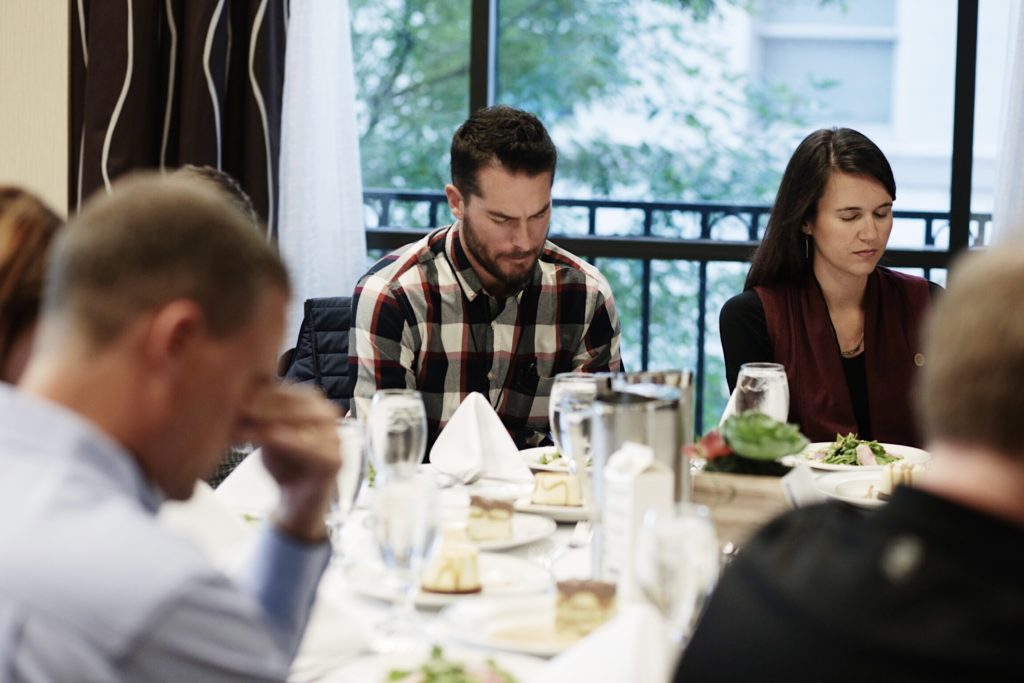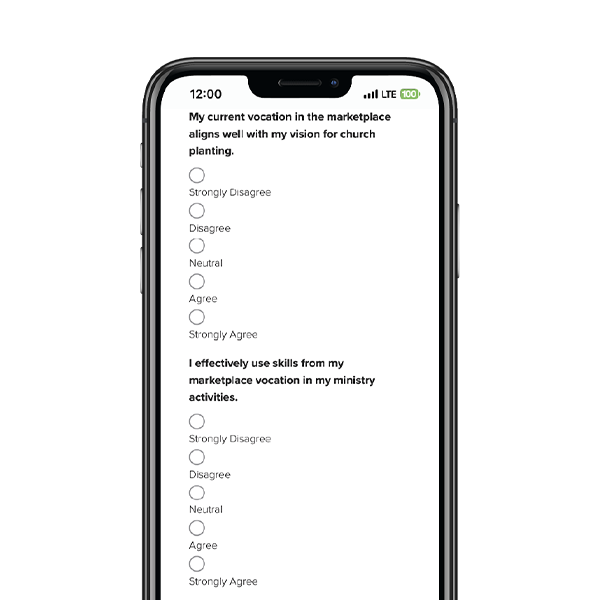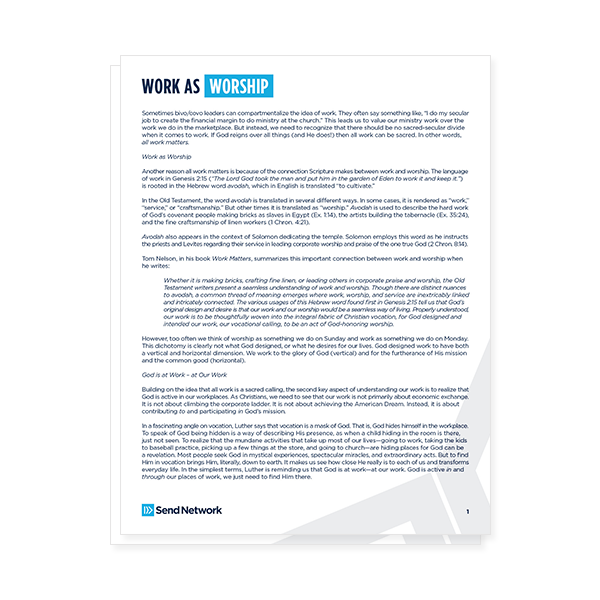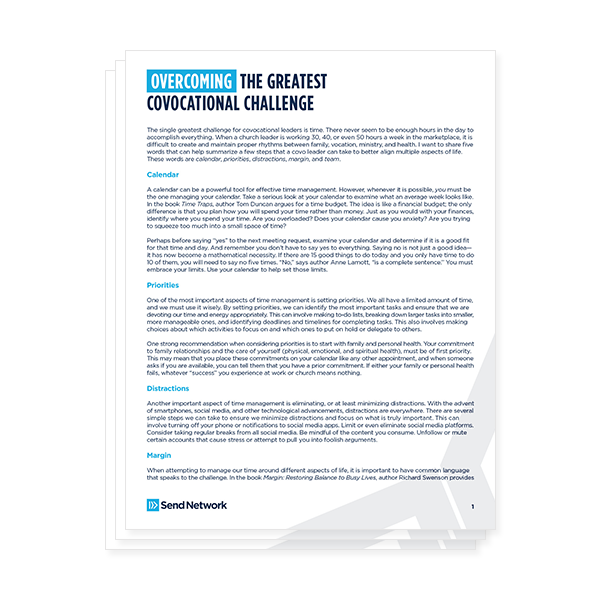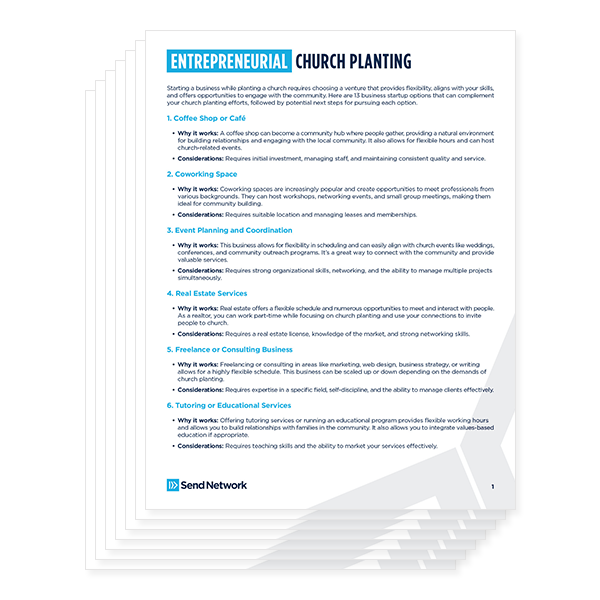One of the greatest barriers to engaging in missionary, church planting behaviors is the absence of time — or what some refer to as “lack of margin.”
In the book Margin: Restoring Emotional, Physical, Financial, and Time Reserves to Overloaded Lives, author Richard Swenson provides an excellent metaphor for overburdened lives. He asks the questions: How ridiculous would it be if the pages of a book had no margin? And, what would be your opinion of a publisher who tried to cram the print top to bottom and side to side so that every blank space was filled up? The result would be aesthetically displeasing and chaotic — much like many of our lives.
Margin is the space between our load and our limits, between vitality and fatigue. It is the opposite of overload and, therefore, the remedy for that troublesome condition.[i]
Margin is this space that guarantees sustainability. This space is where healing occurs, where our batteries are recharged, where our relationships are nourished, and where wisdom is found. Without margin, both rest and contemplation are but theoretical concepts — unaffordable and unrealistic.
We do not follow two inches behind the next car on the interstate — that would leave no margin for error. We do not allow only two minutes to change planes in Chicago — that would be foolish in the extreme. We do not load boats until they are nearly submerged — that would invite disaster. Why then do we insist on leaving no buffer, no space, no reserves in our day-to-day?[ii]
This metaphor is helpful when considering the ideas of missionary behaviors, like neighboring and hospitality, because relationships happen in the margins. When there is no margin, it is impossible to welcome others into our lives. Hospitality toward others cannot be added to already overburdened lives.
Without margin, we are incapable of relational spontaneity in our neighborhood. Without margin, we are uninterested in opportunities to serve our neighbors. Without margin, we are unable to even think about planning time to spend with others. Margin creates buffers. It gives us room to breathe, freedom to act, and time to adapt. Only then will we be able to truly nourish our relationships. Only then will we be available and interruptible for the purposes of God.
But what can we do to create margin? How can we rethink our daily activities so there is time for relationships to flourish?[iii]
Two suggestions:
1. Alignment
When people are first challenged with the exhortation to engage in missionary activities, like loving their neighbor or discovering ways to be more hospitable, a cloud of anxiety often appears. How in the world is a person supposed to add more activities to an already busy week? Part of the answer is to think about alignment, rather than addition. In other words, instead of stressing out about adding more relational activities to a packed schedule, we need to consider how to align the rhythms of our lives alongside the rhythms of others.
Perhaps the best example of alignment has to do with sharing meals. Most people eat 21 meals a week. What would it look like to align two or three of those meals in such a way that you eat with others? Maybe it is breakfast or lunch out? Or perhaps once a week you ask someone in the neighborhood over for dinner. In many cases, you will find it especially easy to invite people for dessert after dinner. Either way, look for activities you are doing already and simply ask others to join you.
2. Audit
Many of us also need to conduct a margin audit of our time. Margin does not just happen. You must plan for it. In a culture that applauds ambition and perpetual activity, you actually will have to fight for it. It is rare to see a life prescheduled to less than 100%. But if we want to live relationally connected, hospitable lives that have space in which to invite others, we must learn to plan our lives at less than full capacity.
We need to take a serious look at our schedules to examine what an average week looks like. In the book Time Traps, author Tom Duncan argues for the need of a time budget. The idea is similar to a financial budget; the only difference is that you plan how you will spend your time, rather than money. Map it out. Just as you would with your finances, identify where you spend your time. Are you overloaded? Does your schedule provoke anxiety? Is there margin where new relationships could be cultivated?
Perhaps you simply need permission to stop. Maybe you need to hear that it is OK to say no. Saying no is not just a good idea — it has now become a mathematical necessity. Without this two-letter word, regaining margin is impossible. If there are 15 good things to do today and you can do only 10 of them, you will need to say no five times.
Paradoxically, in our pursuit of margin we must learn to slow down — to be unhurried. John Ortberg says we “must ruthlessly eliminate hurry from our lives.”[iv] When Jesus says, “Follow me,” he isn’t inviting us into a race. Instead He is welcoming us into a life-giving relationship with Him that should affect all our relationships. As followers of Jesus, we should be in the best position — spiritually and time-wise — to love our neighbors. But often we let the ways of the world dictate our time. rather than the ways of Jesus.
For more on this topic check out, Covocational Church Planting: Aligning Your Marketplace Calling with the Mission of God, published by the Send Network. You can download the free e-book here: https://www.namb.net/send-network-blog/ebook-covocational-church-planting/
[I] Richard Swenson, The Overload Syndrome: Learning to Live Within Your Limits[Kindle Edition] (Colorado Springs: NavPress, 1999), Kindle Location 88-89.
[ii] Richard Swenson, A Minute of Margin: Restoring Balance to Busy Lives—180 Daily Reflections[Kindle Edition] (Colorado Springs: NavPress, 2003), Kindle Location 207-215.
[iii] This section is adapted from a portion of chapter six from Next Door as It Is in Heaven by Brad Brisco and Lance Ford (NavPress, Colorado Springs, 2016).
[iv] John Ortberg, The Life You’ve Always Wanted (Grand Rapids, Mich.: Zondervan, 1997), 81.,
Published May 21, 2019
